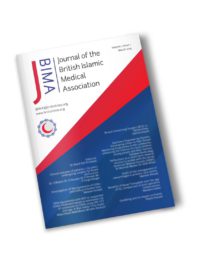
Dear Editor
There is a high prevalence of end-stage organ dysfunction within Asian population in general and the Muslim communities are a sizable component of those ethnicities. Renal failure secondary to diabetes is top of the list1.
32% of patients waiting for a kidney are from Black, Asian and minority ethnic communities2. They often have a significantly longer wait for a successful match due to a shortage of suitably matched donors 3. This is coupled with a shortage of suitably tissue-matched organs due to lack of Asian donors. We know that an increased HLA tissue typing mismatch is a risk factor for rejection4.
When considering the Muslim population, we have a variety of opinions regarding organ donations from the progressive opinions that sees this as an act of ongoing charity beyond death offering the gift of life to needy
individuals5. Fatwas (religious opinion) have been issued by a UK-based Sunni scholar, Mufti Mohammed Zubair Butt, a Juris consult from the Institute of Islamic Jurisprudence in Bradford who In June 2019, produced a
fatwa, Organ Donation and Transplantation in Islam: An Opinion and a similar one in 2000 from the European
Council for Fatwa and Research6,7.
On the other extreme, there is a sizable body of scholarly opinion that considers organ donation to be forbidden (Haram) and a form of body mutilation and desecration of its sanctity. The body should be buried whole without
subjecting it to any unnecessary procedures or taking away any parts from, these are same views to those
against autopsy it8,9.
The mainstream view within the Muslim is more undecided due to the ignorance of the progressive points of view and the apprehension of the unknown and misconceptions of how the body is treated such as loss of dignity and the delay in expeditious burial which is very important in Islam.
Research has shown that many families are not aware of their members wishes to become organ donors or that they’ve signed up to the register. With such differing opinions on organ donations within the Muslim communities and within the same families it becomes even more important to have an honest and frank dialogue amongst those families on this subject. The wishes of those who agree to it should be well known, respected, and accepted and thereafter honoured if they tragically die and the family is approached by the donor team11.
References
- Mathur R, Dreyer G, Yaqoob MM, et al, Ethnic differences in the progression of chronic kidney disease and risk of death in a UK diabetic population: an observational cohort studyBMJ Open 2018;8:e020145. doi: 10.1136/bmjopen-2017-020145
- https://www.nhsbt.nhs.uk/how-you-can-help/get-involved/community-investment-scheme/organ-donation-projects/
- https://www.organdonation.nhs.uk/helping-you-to-decide/organ-donation-and-ethnicity/
- Zachary AA, Leffell MS. HLA Mismatching Strategies for Solid Organ Transplantation – A Balancing Act. Front Immunol. 2016;7:575. Published 2016 Dec 7. doi:10.3389/fimmu.2016.00575
- Source: Ṣaḥīḥ Muslim 1631
- https://nhsbtdbe.blob.core.windows.net/umbraco-assets-corp/16300/organ-donation-fatwa.pdf
- https://www.e-cfr.org/%D9%86%D9%82%D9%84 %D8%A7%D9%84%D8%A3%D8%B9%D8%B6%D8%A7%D8%A1/
- Khan, Arshad (2003). Islam, Muslims, and America. Algora Pub. p. 210. ISBN 9780875861944
- https://emedicine.medscape.com/article/1705993-overview
- https://religionmediacentre.org.uk/factsheets/death-funeral-rituals-in-world-religions/
- https://www.organdonation.nhs.uk/get-involved/news/hundreds-of-transplants-missed-each-year-because-families-don-t-know-what-relative-wanted/

